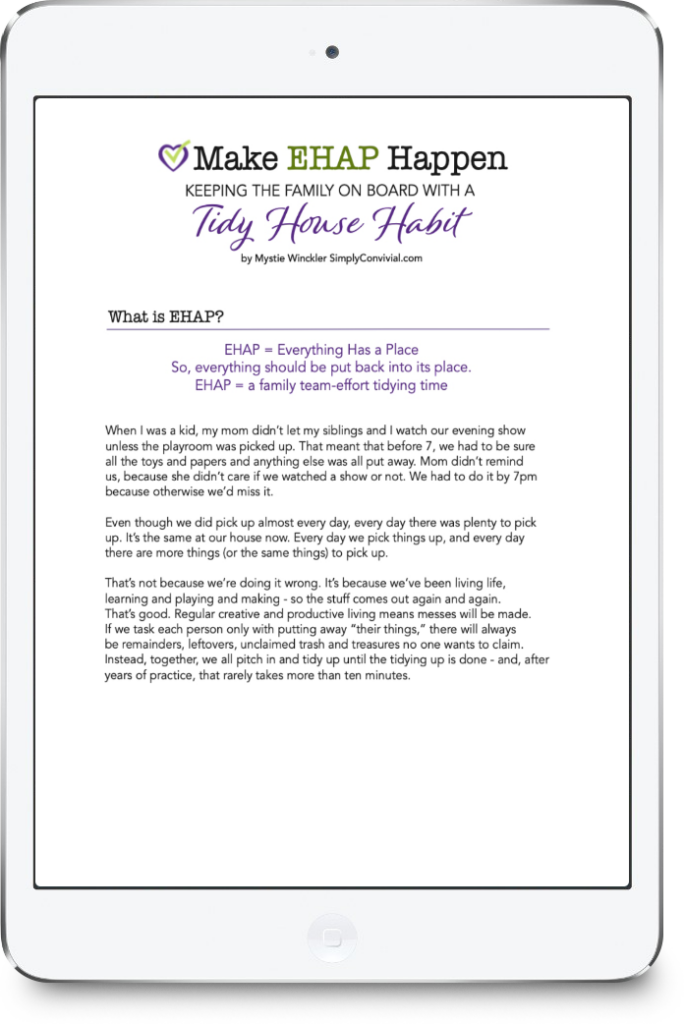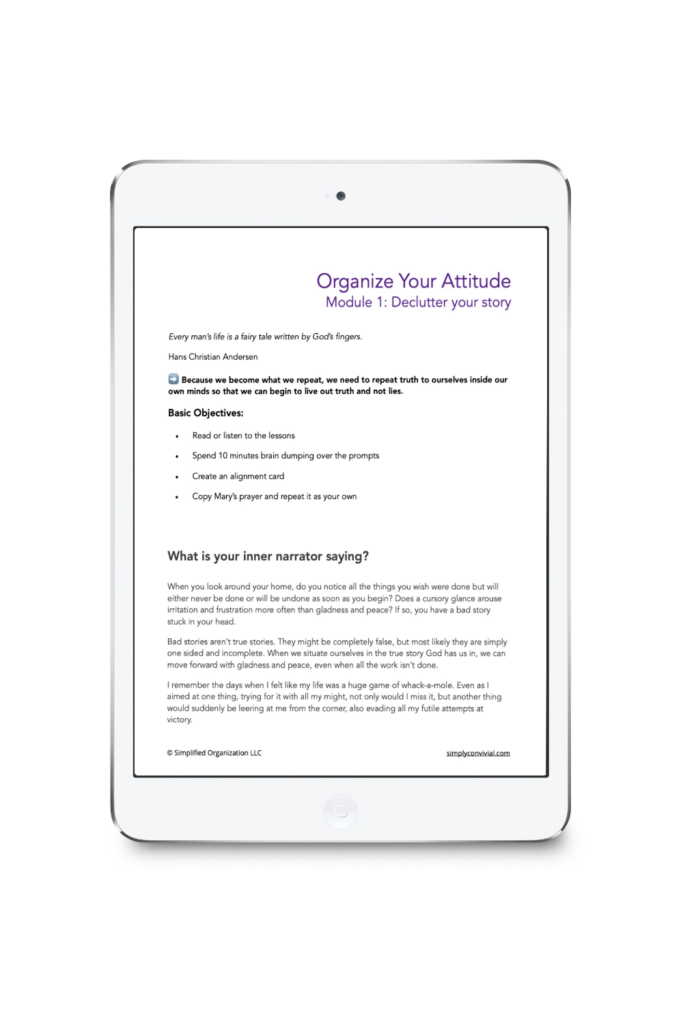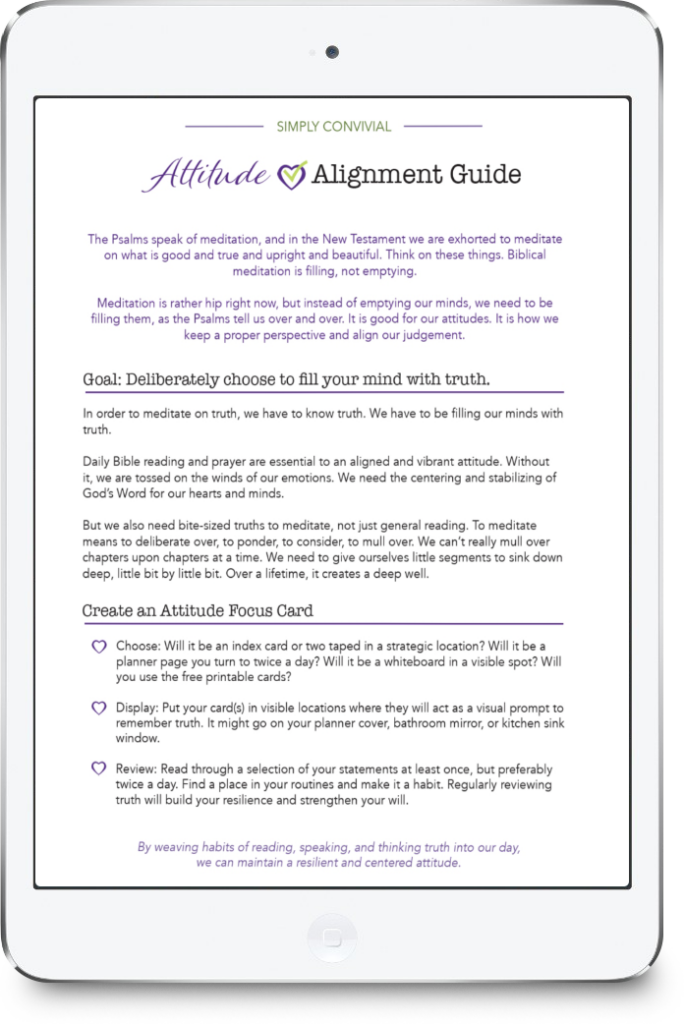Have you ever looked around the house, noticing how many things need to be done? There are usually so many things we ought to do that we feel overwhelmed with the options and the demands. Then we end up doing none of them.
If you frequently feel stressed and frazzled, it might not be because there’s too much to do. The solution might not be cutting back, even if you’re always feeling one step behind, dropping balls left and right.
It could be perfectionism you need to drop, not responsibilities or commitments.
If we beat perfectionism and reject overwhelm, we can handle our housework and mothering in a way that honors God.
Today I want to share the stories of three moms who have learned how to manage life capably, confidently, and cheerfully.
Recovering from Postpartum Chaos
When Naomi Marks joined Simply Convivial Continuing Education, her biggest ambition was simply to not have Cheerios on the floor all the time.
With seven kids and an eighth on the way, everything felt like a disaster.
For the first part of their marriage, Naomi’s family moved about once a year while also adding babies on the regular. No wonder it felt hard.
The first and most important shift Naomi made was to change the way she thought and talked about her life and her duties.
“Change the story you’re telling yourself in your head.”
Instead of thinking or saying, “My kids are just trying to make my life harder,” she reminded herself that the job of a mom is caring for children. Children need care, and that’s why she’s there.
She identified another wrong story she’d fall into. She realized she was thinking of her home as a doll house. She wanted to be able to arrange the things and the people and have them stay put.
Of course children AND their things don’t stay put, so not only is there work to do, there’s an accompanying sense of failure and frustration. However, erasing the wrong story – not the work – is the key to finding relief for discouragement.
Overwhelm, Naomi discovered, is a feeling and a choice.
“I can choose to not feel overwhelmed and I can choose a different story. But this life is what God gave me, so I must be able to do it in Him.”
One of the first baby steps Naomi took was building the habit of never going to bed with dishes in the sink. This change alone made her feel more on top of her life and home. From there, she pulled up out of a negative spiral into a positive spiral as she recognized she could make use of five minutes here and there to accomplish significant progress.
Naomi began the transformation of her attitude and the story in her head by writing alignment cards and plastering them all over around her desk and kitchen. An alignment card is a post it or index card with a written verse, motto, or quote meant to be read, reviewed, repeated over and over again to replace lies with truth in our thoughts.
Some of Naomi’s favorite cards are:
“I have enough time to do the will of God”
“Be an observer and experimenter, not an Eeyore”
She also adopted the motto “Just get up and make dinner.” After all, she realized, I can always do that to stop sitting morosely thinking about how hard everything is. Getting up and doing something, even something small and basic, helped her climb out of her discouragement.
By doing 15 minutes of organizing at a time, 20 times a month, Naomi actually got ahead of housekeeping in a way she never had before when she thought of it as a single, all-encompassing project.
Every drawer, every closet, every room has been gone through in just half a year.
Going through everything, cleaning and organizing, in 15 minute chunks here and there was completely painless, she says, even while homeschooling, having babies, and being a pastor’s wife.
Learning to Be Consistent in Small Things
Clarissa has been married for 14 years to her husband Mark. She’s a homeschooling mom to 4 kiddos, and she also enjoys reading, traveling, and gardening. Clarissa is now a recovering perfectionist.
She’d see huge projects like “clean the garage,” know she couldn’t get it done in a day, and so never do anything at all about it. This approach is perfectionism, and perfectionism brings overwhelm. It also makes life chaotic and stressful.
Clarissa admitted her unrealistic expectations that she could do everything on her list, that she could do more in a day than is possible, and keep her house super-clean all the time. Of course, she never did. On top of unrealistic goals, however, she also realized unrealistic her time management was.
I asked her what made the most difference for her in overcoming her feeling overwhelmed and frazzled.
“I would say baby steps, learning how to break things down into smaller, manageable pieces with the family and homeschooling. Little things like a 15 minute tidy or EHAP do add up. We do now have 15 minute tidies after lunch and after dinner. It’s made the biggest difference in my housekeeping.”
Before doing Simplified Organization Community Coaching, Clarissa would think that on Saturday morning they’d clean everything so they could then not do anything during the week or at least just a bare minimum during the week.
Now, instead, she starts to do just the little baby steps, and it would keep her from getting overwhelmed because she could find 15 minutes to pick things up with the kids when she couldn’t get two hours to clean on Saturday morning.
Even with her garage, she’s now tackling it fifteen minutes at a time as she can, and seeing significant progress.

Want a Tidier House?
- Get clear where and when your family needs to tidy up.
- Bring the kids on board to take responsibility for tidying more than their own stuff.
- Learn the three steps to make the habit stick for the long haul.
Rejecting the negative inner narrator
Gracie Madgwick was at a rough point, mentally and emotionally, when she joined Simply Convivial Continuing Education and started Simplified Organization Community Coaching. She faced much overwhelm, increased by an obsessive-compulsive disorder. She lived daily with mental turmoil and discouragement.
Gracie is a west coast California girl transplanted to the wheat fields of the Midwest. She loves her God-given callings of daughter of the King of kings, wife to her husband, Stephen, and mother and teacher to their eight children. Some of her greatest joys are time spent home educating her children, a good family read aloud, toddler antics, and a hot cup of British-style black tea.
She knew she needed to get a handle on her life, but she didn’t know where to start. So many of the planning pieces seemed like just one more thing to do, and she already didn’t have enough time to do what she ought.
Worse, however, was the fact that she was not dwelling on enough truth and gratitude and trust in her situation.
She began, then, by recognizing what she was telling herself in her head about her life. She needed the reminders to adjust her attitude, but she also needed to be given tools to start implementing life management practices.
As soon as she shifted her attention to truth about her situation, she began to see huge personal growth.
“It’s been one big blessing after another.”
She has found a trio of tools now that help her manage her home duties with cheerful energy: a weekly dashboard, a weekly review, and a top three daily card.
She says that what it really all boils down to is just writing stuff down. Write it down, get it out of your head. Holding too much in your brain contributes to feeling overwhelmed and stuck. After embracing the habit of writing things down, Gracie noticed that she became a better problem solver. Better solutions and more ideas came to her.
“The overwhelm really is in our heads. We have to clear our heads to get over it.”
Writing things down gives you that outside-of-yourself ability to see what’s going on, to celebrate progress you hadn’t noticed, and to take the next step of faithfulness.
Every checkmark is a little mini-celebration, and Gracie learned to embrace thinking of them that way. So she’d get part way into her morning and feel like she hadn’t done anything, then she’d look at her dashboard and realize she could check some things off. These practices really do help to build motivation and to feel truth. It is experiencing traction.
However, she did admit that it can be overwhelming initially to start writing things down. You’re not sure if it’ll help or if you’ll just be more overwhelmed when you see all that data down on paper. She said, “I think the answer is that it does help. It has helped me a lot.”
A weekly review might seem like a big deal, like it would take a lot of time, but Gracie has found it best if she keeps it simple and takes only 20 to 30 minutes. It doesn’t have to be an hour and half. If you’re doing regularly, it can be a big blessing
Gracie noticed that as we are implementing new practices in any area of life, it’s hard to see our own growth. Growth is slow. It’s not overnight. It’s hard to analyze where there’s been personal growth. So outside input is very helpful, especially from her husband. She learned to stop when she felt discouraged and ask him if he was seeing progress because she knew he had seen her grow through this process.
Walking in faithfulness at home
Wrapping our heads around our responsibilities and getting a handle on everything there is to do is a big deal. It’s hard.
As she talked about her experience, Naomi noted: “There’s a difference between self-help, about just grabbing what I want, and the way you’ve structured Simply Convivial and the Community Coaching program to be about what God wants for us as wives and mothers.”
As Clarissa worked through the program she realized what God wants for her, and she felt like she’d been given the tools to help her do that. She recognized the housework and parenting she did all day as her act of worship and service God had given her.
“Your home duties are your death to self. Go get it and learn to enjoy it along the way.”
We always have grander hopes and visions than reality allows. Gracie said, “I can look back at two and a half years as a member and wish that I had taken more steps. But the reality is that if you are taking steps and you are implementing some of the things you have learned, growth happens and the small victories add up.”
The beauty of these courses is you don’t have to sit down for all of them and spend a great amount of time. Just listening to a module is an average of 10 minutes, and you can do that while you fold laundry or do some small job that’s not gonna take a lot of your mental effort. It doesn’t take a lot of time to listen and get encouraged; then you can let it percolate. It makes a difference.

FREE ACCESS TO
“Declutter Your Story”
Module 1 of Organize Your Attitude
The Organize Your Attitude course inside Convivial Circle will teach you how to change your thoughts and choose your feelings so you can create a positive, loving atmosphere in your home.



